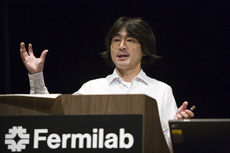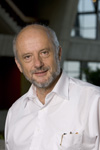|
Tuesday, Dec. 18
3:30 p.m.
DIRECTOR'S COFFEE BREAK - 2nd Flr X-Over
THERE WILL BE NO ACCELERATOR PHYSICS AND TECHNOLOGY SEMINAR TODAY
Wednesday, Dec. 19
THERE WILL BE NO FERMILAB ILC R&D MEETING THIS WEEK
3:30 p.m.
DIRECTOR'S COFFEE BREAK - 2nd Flr X-Over
4 p.m.
Fermilab Colloquium - One West
Speaker: R. Barry, University of Colorado, Boulder
Title: The Role of Snow and Ice in the Climate System
Click here for NALCAL,
a weekly calendar with links to additional information. |
Tuesday, Dec. 18
- Creamy turkey vegetable
- Chicken gyros
- *Salisbury steaks w/mushroom au jus
- Chicken cacciatore
- Italian panini w/provolone
- Assorted slice pizza
- Super burrito
*Carb Restricted Alternative
Wilson Hall Cafe Menu |
|
Wednesday, Dec. 19
Lunch
- Salmon and spinach Wellington
- Mixed greens w/radishes and raspberry vinaigrette
- Almond butter cake
Thursday, Dec. 20
Dinner
- Chestnut soup w/cognac cream
- Medallion of lobster w/champagne butter sauce
- Steamed spaghetti squash
- Sautéed pea pods & red pepper
- Spinach pomegranate salad
- Raspberry parfait w/assortment of Christmas cookies
Chez Leon Menu
Call x4598 to make your reservation. |
|
|
Project X plans second workshop

Hitoshi Murayama, University of California -Berkeley/Lawrence Berkeley National Laboratory speaks about the The Intensity Frontier of the Quantum Universe.
As Fermilab and U.S. particle physics struggle with the implications of the proposed FY2008 omnibus funding bill, the importance of a clear and compelling plan for the future becomes even greater. In the second workshop in a series to address the discovery opportunities of Project X Fermilab UEC and Fermilab will bring scientists together to plan the experiments and strategies to deliver cutting-edge research.
In November, a workshop to lay the groundwork for a physics case for Project X drew about 250 people from 78 institutions. An accelerator workshop that delved into uses of Project X drew 175 people from 25 institutions.
Response at both meetings was enthusiastic, drawing interest from a wide spectrum of Fermilab users.
To further the progress achieved, Fermilab will host a second workshop Jan. 25-26.
"This time we will focus on the details of the experiments which might be proposed to take advantage of a high-intensity proton source, their physics impact, and the development of the overall experimental strategy," said Fermilab Deputy Director Young-Kee Kim.
The Steering Group Report released this year to prioritize resources for the next decade proposes that Fermilab conduct research and development on Project X.
The workshops give accelerator laboratories and universities a chance to discuss how best to provide resources for the high intensity proton source and how it would fit into the worldwide landscape of high-energy physics experiments.
"In the first workshop, we learned about physics that would be complementary to the LHC in the next decade," said Kevin Pitts, chair of the Fermilab Users Executive Committee. "In this second workshop, we'll zero in on the details of the experiments that are being considered."
Subgroups from the first workshop are charged with coordinating efforts to detail a case for discovery in neutrino, kaon, muon and antiproton research that will be presented to the P5 at a meeting Jan. 31 through Feb. 2 at Fermilab.
Information about the workshop, working groups and registration information is available here.
There is no registration fee.
Information about the first workshop, including the talks can be found here.
-- Tona Kunz
|
Free for all

Forget about paying for journal subscriptions. If a new proposal takes hold, particle physics journals would get their funding from labs, libraries, and agencies that sponsor research, and readers could peruse them for free.
The next big experiment in particle physics won't need an accelerator, detector, or other big machine. It doesn't even involve subatomic particles-unless you count the electrons that flow through electronic circuits, carrying bits of information from one human brain to the next.
Instead, it will test a new way to circulate the theories, methods, and experimental results that are the lifeblood of science.
If it works, no one will have to pay to read most particle physics results. The journals that publish most of the research in the field will be available free online to anyone, anywhere and any time. Money to run the journals-including the cost of having experts review each article before it sees print-would instead come from funding agencies, laboratories and libraries through a consortium called scoap3, the Sponsoring Consortium for Open Access Publishing in Particle Physics. This would give journals a stable source of funding while reducing the total cost to libraries and readers.
The proposal is the latest twist in open-access publishing, a worldwide movement whose goal is to pull down barriers to the free flow of information while preserving a system that has kept watch over the integrity of science for nearly 350 years.
Read More
|
Flocking to Fermi
From Daily Herald,
Dec. 12, 2007
Just after dawn on a December Sunday, the fields and ponds of Fermilab are anything but quiet.
Thousands of geese, ducks and other birds call the 6,800-acre lab home for the winter and they are making a joyful noise.
They aren't alone.
Peter Kasper stands on a berm between two ponds on the lab's eastern edge scanning the flock with a pair of binoculars and what looks like a small telescope on a tripod.
Kasper, who lives in Batavia, works at the lab as a physicist, but for the past 20 years he has been making the early morning trips to Fermi for the pure pleasure of bird watching.
Read More
|
|
|
Black Monday
 |
| Pier Oddone |
Yesterday we received the language of the House-Senate compromise on the FY2008 omnibus budget bill. that the House approved last night and the Senate will vote on in the next couple of days. The budget proposed in their report is devastating for High Energy Physics at a time when we have the most promising program in generations. The report is especially punishing of Fermilab's programs.
The House-Senate compromise asks Congress to cut the High Energy Physics budget well below the budget for FY07. Their report eliminates nearly $90 million from the President's FY2008 budget request to Congress for the funding of High Energy Physics within the Office of Science. The cuts come primarily in two programs that are essential for the future of particle physics in the U.S. and for Fermilab. In the first major cut, the R&D on the International Linear Collider and the R&D on Super Conducting Radio Frequency (SCRF) Accelerators are cut back to 25 percent of the planned budget for FY08, a level far below FY07. Since a quarter of the fiscal year has already gone by, this essentially means a shutdown of the R&D on ILC and SCRF for the rest of the fiscal year. This is a body blow to the future of the ILC, the U.S. role in it and Fermilab. The second major cut is in NOvA, a cut whose implications we are still trying to understand but that causes enormous harm to our future neutrino program. These proposed cuts, which come on top of the very limited particle physics budgets of the last few years, are destructive of our field and our laboratory. There is no way to sugar-coat this.
This news comes to Fermilab at a time when we should be celebrating success. The American Institute of Physics selects the ten top physics results for the year throughout the world. For 2007, three of the ten are the result of Fermilab's facilities and people: the MiniBooNE result on the nature of neutrinos, the Tevatron results of CDF and DZERO at the energy frontier, and the Pierre Auger result on the origin of ultra-high energy cosmic rays. Thus, our three strategic areas, neutrinos, the high energy frontier and particle astrophysics, are all in the top ten. We could not have built a stronger foundation for the future of particle physics in the U.S., but that now is jeopardized in two of these three frontier areas of research as a consequence of the proposed Congressional budget.
While I am doing everything possible to steer the ship away from the iceberg, we must be prepared for an extremely difficult situation in 2008. The omnibus bill must be passed by both the House and the Senate, and after that, the President has to sign the bill for it to become law. If this bill becomes law I will be discussing consequences with you in more detail. Until then, I and many others who understand this disaster in the making are trying to inform Congress and the Administration of the dire consequences to the U.S. particle physics research program. These may be unintended consequences that were not considered in the pressure-cooker atmosphere that accompanies an omnibus budget bill.
We will hold an All-Hands meeting at 11 a.m. on Thursday, December 20, when we expect to have more information.
|
|
Project X physics workshop Jan. 25-26
Fermilab will host a second users' workshop Jan. 25-26 to discuss the physics of Project X. The workshop will focus on the details of the experiments that might be proposed to take advantage of a high-intensity proton source, their physics impact
and the development of the overall experimental strategy. Information about the
workshop, working groups and ongoing efforts is available online.
FNALU cluster meeting Dec. 19
There will be a general meeting for experimenters using
the FNALU cluster on Dec. 19, in Wilson Hall One West from 1:30 - 3:00 p.m.
The purpose of the meeting is get input from experiments on what
resources are needed and to identify experiments using FNALU.
Also the status of support and other changes to FNALU will be discussed.
New IT job descriptions
Open meetings for questions and answers will be held in Wilson Hall One West for employees affected by this process:
Tuesday, Dec. 18, 9 - 10:30 a.m.
Wednesday, Dec. 19, 9 - 10:30 a.m.
Before attending, please review the presentation
Blood Drive Dec. 18, 19
Mark your calendars. Heartland Blood Centers will be here for the Fermilab Blood Drive on Dec. 18 and 19, from 8 a.m to 2 p.m. in the Wilson Hall Ground Floor NE Training Room. Appointments can be scheduled on
the Web or by calling Diana at x3771 or Margie at
x5680. More information can be found here.
Scottish Country Dancing hosts
holiday party Tuesday
Scottish Country Dancing will hold a holiday party Tuesday, Dec. 18, at Kuhn Barn on the Fermilab site. Instruction begins at 7:30 p.m. and newcomers are always welcome. Most dances are fully taught and walked through, and you do not need to come with a partner. The group will not meet on Dec. 25, but is tentatively planning to meet on Jan. 1. Please call or email to check. Info at (630) 840-8194 or (630) 584-0825 or e-mail folkdance@fnal.gov.
Additional Activities |
|